Contents
Grapes Bohemia (Bohemia) – a table variety of culture, quite popular in many countries of the world. In addition to summer residents, the variety is in great demand among professional winegrowers. It can be grown both for personal consumption and for the purpose of subsequent sale.
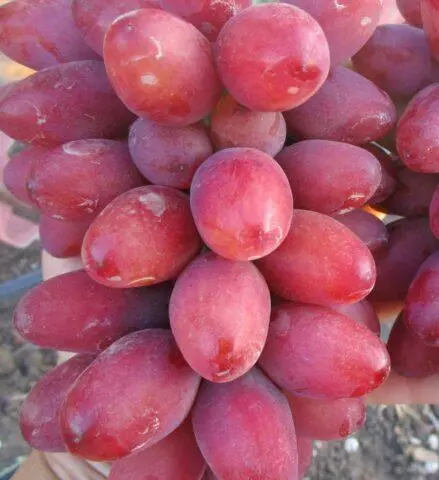
The berries of the variety have an exemplary nutmeg taste.
History of occurrence
Bohemia grapes are a hybrid of Ukrainian selection, obtained by crossing such crop varieties as Common Malva (Malva) and Millennium (Millennium). The variety appeared in the city of Zaporozhye, thanks to the work of the famous breeder Vitaly Zagorulko.
Description of the Bohemian grape variety
Bohemia is an early grape variety, the fruits of which begin to be eaten in the summer. The bushes of culture are vigorous, but rather compact, about two, maximum two and a half meters high. Antennae are located on the shoots. The yield of the plant is high. In particular, this is influenced by the fact that the snow-white flowers of the variety are bisexual.
bunches
Clusters of grapes are loose, have a mass of more than 0,5 kg, an average of 600 g, but individual specimens can reach 1 kg. They are cylindrical in shape, wider at the base than at the end. They ripen evenly, without peas. On one vegetative shoot, three pieces are laid. All bunches are characterized by a good trade dress, they look beautiful on the table, they are suitable for sale on the market.
Berries
The berries of the Bohemian variety are large or medium in size, ovoid-nipple-shaped. The length of each is 2 cm, weight – about 20 g. There is a slight wax coating on the surface of the berries. The peel is opaque, dense. The color is attractive, red, with characteristic veins, like gooseberries. Sugar accumulation is above average.
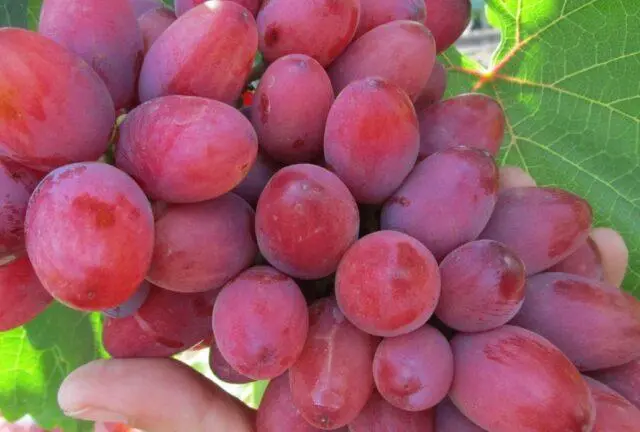
Bohemian grape berries have a high resistance to rot
Vine
The vines of the plant are dense and powerful, covered with oval leaves of dark green color, consisting of five lobes. Outside, the leaves have small white stripes, rough on the inside, with a barely noticeable wax coating. Internodes are medium in size.
Characteristics of Bohemian grapes
The hybrid has a lot of positive qualities. It is characterized by early ripeness, high yields, excellent taste, good frost resistance and medium drought resistance. The variety can be grown for various purposes. It is well transported, can keep its qualities for a long time in a dark cool place.
Ripening time for Bohemian grapes
The period of the beginning of ripening of the grapes of the presented selection begins already in the first days of August. The vegetation period, judging by the description of the variety, is 110 days from the beginning of flowering. Active fruiting of the crop is observed already in the second year after planting.
Bohemia grape yield
The variety has a high yield. To achieve maximum performance, it is important to provide the bushes with a small load. With proper care, more than 10 kg of berries are harvested from one adult plant. After ripening, the crop can be stored on the bush without loss of quality for up to two months.
Taste of Bohemian grapes
The taste of the grape variety is sweet. The aroma of the variety is pleasant, nutmeg, with fruity notes. The pulp is fleshy, dense. The tasting score is 8,6.
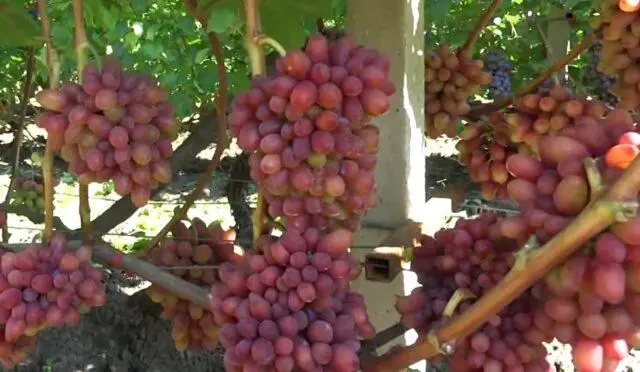
If the Bohemian grape bushes are overloaded, then the taste of the berries deteriorates.
Growing regions
Most of all, the variety is suitable for growing in the southern regions of Our Country. It is allowed to land in the Volga region. Most often, culture can be found on the territory of the Crimean peninsula, in the regions of the Krasnodar Territory, in the Caucasus.
Frost resistance
Variety Bohemia is frost-resistant. Able to tolerate temperatures down to -22 ° C, but young bushes up to three years old need warming. With the advent of cold weather, they need to be laid on spruce branches, and covered with foil or corrugated cardboard on top. In growing regions with colder winters, Bohemia grapes are covered at any age.
Drought tolerance
Bohemian grape bushes have moderate drought tolerance. Moisturize the plant is required twice a month. It is allowed to reduce the number of waterings only if the plant is mulched with straw.
Disease and pest resistance
The variety is quite resistant to most diseases. Of the ailments that can affect the variety, only olive blotch, fruit rot and powdery mildew are distinguished.
From insects, the plant is attacked by ticks and fleas.
Methods of Use
Bohemia is ideal for fresh consumption, it contains many useful substances and vitamins. In addition, berries are often used in winemaking. Many housewives prepare delicious compote from them for the winter.
Advantages and disadvantages
The Bohemian variety has a number of positive and negative qualities, but it should be noted that the variety has much more advantages.
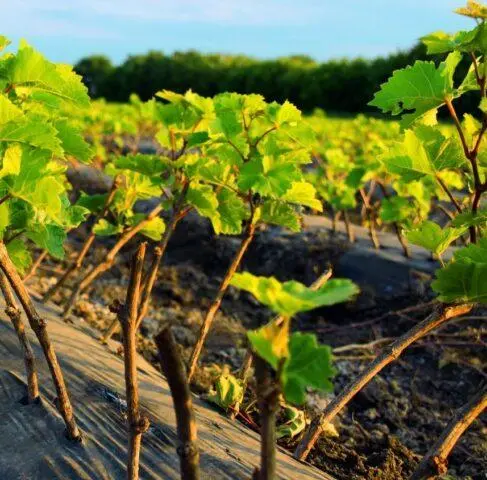
Vaccinated grape seedlings have higher immunity
Advantages:
- early ripening;
- quality harvest;
- good transportability;
- universal application;
- cold resistance;
- compact size of the bush;
- good commercial qualities;
- strong immunity;
- excellent taste.
Disadvantages:
- demanding watering;
- small size of clusters;
- susceptibility to powdery mildew;
- the difficulty of rooting seedlings.
Features of landing
Bohemia is a grape that grows well and bears fruit, regardless of the illumination of the site. It can be planted both in the sun and in the shade.
Preference should be given to places with nutrient soil, on loam or chernozem. The pH content must be low. If the soil is too acidic, then it should be limed.
When buying Bohemian seedlings, they are chosen according to the following criteria:
- developed root system of a plant with a length of at least 20 cm;
- height of material for planting from 100 cm;
- the presence of a trace of vaccination near the root neck of the seedling;
- the absence of damage on the handle and areas of influence of insects.
Before planting grapes in the fall, they dig a hole 80 cm wide and 60 cm deep. They fill it with rubble, peat or humus. At the time of planting, a hill of fertile soil is poured on top of the drainage, a seedling is placed, spreading its roots over the surface, well covered with earth, tamped, watered. A bush support is dug in next to the hole.
When planting several Bohemian seedlings, a distance of about 300 cm is kept between them, the inter-row space is made at a distance of 4 cm.
Care instructions
Caring for the Bohemian variety cannot be called difficult. The only thing that is very demanding culture is high-quality watering. It must be carried out on time, about once every half a month, spending 25 liters of settled warm water per bush.
Feeding is optional, but the yield depends entirely on their availability and quality. If you neglect the fertilizer of the crop, then it is unlikely that you will be able to collect many good berries. Top dressing begins to be applied two years after planting the plant according to the following scheme:
- in the spring, 2 kg of humus is poured under the root of the Bohemia grape;
- in the middle of summer, they are fed with a solution of potassium nitrate (5 g of the substance is taken for 30 liters of water);
- a couple of weeks before harvesting, fertilize with ammonium nitrate (120 g per bucket of water);
- in mid-autumn, minerals and organic fertilizers are applied.
A mandatory procedure during the care of grapes is pruning bushes. When flowering ends, all extra shoots are removed from the Bohemian variety, leaving up to eight eyes on each. Dry and damaged vines are also pruned, which interfere with the full development of the culture.
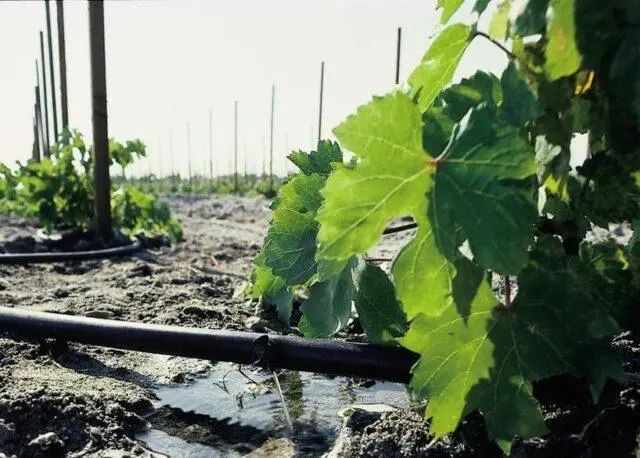
When growing Bohemian grapes, it is required to monitor the quality of watering
Conclusion
The Bohemian grape is a variety that, with proper care, shows excellent results. The fruits are very tasty, high quality, versatile in use. Despite the fact that the variety appeared relatively recently, it has already managed to win the love of gardeners and get a lot of positive feedback.









